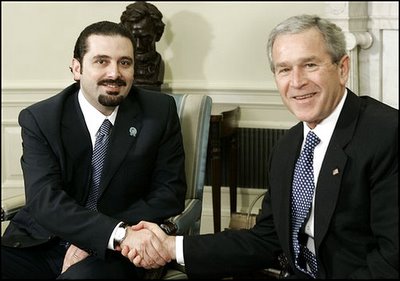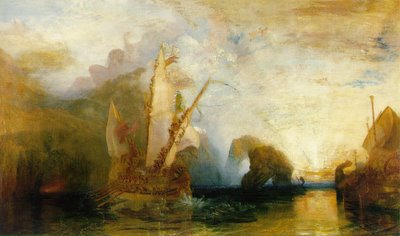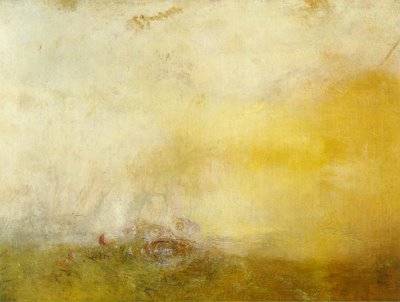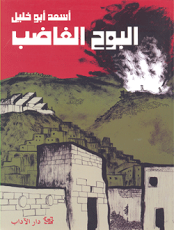Tuesday, January 31, 2006
Monday, January 30, 2006
*The word in question is wisayah, which in the Lebanese political context is best translated as undesirable guardianship.

Struggle in Saudi Arabia: Sahar Mandur of As-Safir is right. Why is AlJazeera devoting so much time to the coverage of Arab/Muslim protests against Danish and Norwegian publications? (All Arab media are now consumed by that story.) I mean, it is not that the region is not suffering from foreign occupations, poverty, and oppression. And the picture above is really about "struggle" in Saudi Arabia. The store is informing customers that they don't carry any Danish products. That should take care of our problems in the Arab world. (My mother, I found out yesterday, is also quite angry at the Danish press. She heard about my comments here about that, and she strongly disagrees. She argues that if you are outraged at the Danish publications, it does not mean that you are not outraged at the other issues.)
Sunday, January 29, 2006
 So do Iraqis seem happy in their "liberated" country? Well, this picture was taken yesterday in Baghdad. Do they seem pleased with the fruits of "liberation"?
So do Iraqis seem happy in their "liberated" country? Well, this picture was taken yesterday in Baghdad. Do they seem pleased with the fruits of "liberation"?
Saturday, January 28, 2006
Friday, January 27, 2006
 Palestinians in `Ayn Al-Hilwa refugee camp in South Lebanon organized their own symbolic "election" voting for the right of return.
Palestinians in `Ayn Al-Hilwa refugee camp in South Lebanon organized their own symbolic "election" voting for the right of return.
The Demise of the Fath Movement: and what is Hamas? Does anybody know? This was destined to happen. The Fath movement (nobody knows when it was founded and Lebanese writer Michel Abu Jawdah found, when interviewing the founders, that they gave different dates as to when it was actually founded--sometimes in late 1950s), was destined to fall. It was so closely linked to the personality and leadership of `Arafat; it fell with him, it seems. `Arafat did not want a movement that would institutionalize Palestinian struggle for independence, or to husband their popular resources. Instead, he institutionalized corruption through the PLO and Fath structures. I never ever admired Fath as a movement, or its rhetoric, particularly its rhetoric, not to mention what it did under `Arafat, who ordered the murder of a cartoonist, Naji Al-`Ali, I shall never forget, and who agreed to the humiliating conditions of Oslo, and who, with Sadat and Saudi Arabia did the most to undermine Palestinian struggle for liberation. But there were many decent and honest members of Fath that I liked and admired. One of them remains a friend to this day. He tried to recruit me back when I was in high school: he recruited a few at my high school, and he was frustrated at my strong opposition to Fath. He now lives in the

Mini-Hariri meets Mini-Bush: Two intellectual giants in one room. I mean, look at those two. Really. Just look at those two. I would love to just listen to those two talk about international affairs. Would you not? I mean, would you not be tempted to just sit in the room and watch them and listen to them as they embarrass themselves, and then suppress strong urges to laugh as you watch those two attempt to engage in an "intelligent" discussion of foreign policy? Would you not want to be there just to mock them, and then to go and tell your friends about witnessing those two discuss foreign policy? I bet they got along. I mean, where else would you find a foreign "leader" who is at the very same, very low, level of George W. Bush? Where else would you find somebody as ignorant of the world and its affairs, and as intellectually uncurious, as those two? And could you imagine how the assembled aides must have felt while watching those two talking? Bush tells us that: "We've just had a very interesting and important discussion about our mutual desire for Lebanon to be free." (thanks Mounzer) I bet it was interesting. You finally found your equal, o George W. Bush. Somebody as intellectually distant and aloof and ill-informed as you are. Yesterday, in one meeting I heard mini-Hariri say that the countries of the West gave, yes gave, billions to Lebanon in Paris II. In reality, Lebanon did not even get 1/5 of a billion. All what Lebanon got were promises and pledges of loans, more loans to be added to the billions of loans that Rafiq Hariri enslaved Lebanon with for years and decades to come. Also, please take a minute to look at the smile on their faces. It speaks volumes.
Thursday, January 26, 2006
 Dido building Carthage; or the Rise of the Carthaginian Empire, 1815. Turner, Joseph Mallord William.
Dido building Carthage; or the Rise of the Carthaginian Empire, 1815. Turner, Joseph Mallord William.
Crooks, thieves, charlatans, and demagogues: Bush’s Doctrine in 2006. Now, really. It is high time to evaluate Bush’s doctrine in this year. This new Palestinian election-under-occupation is big, and the results are quite significant not only in terms of Palestinian struggle, but also in terms of Bush’s so-called project for changing the
Wednesday, January 25, 2006
 When Hummus Hit the Fan. I shall make this a regular feature as was suggested by some readers. Yesterday, former Hariri minister, and current Hariri MP, Samir Al-Jisr, was supposed to give a talk at the Lebanese University complex in Al-Hadath. Upon arriving, supporters of Hariri and supporters of Amal exchanged insults and counter-cheers, and it quickly escalated and members of the two sides engaged in physical fights. There were injuries, and Al-Jisr had to flee for his life. Before fleeing, he asserted that Hasan Nasrallah really liked Rafiq Hariri.
When Hummus Hit the Fan. I shall make this a regular feature as was suggested by some readers. Yesterday, former Hariri minister, and current Hariri MP, Samir Al-Jisr, was supposed to give a talk at the Lebanese University complex in Al-Hadath. Upon arriving, supporters of Hariri and supporters of Amal exchanged insults and counter-cheers, and it quickly escalated and members of the two sides engaged in physical fights. There were injuries, and Al-Jisr had to flee for his life. Before fleeing, he asserted that Hasan Nasrallah really liked Rafiq Hariri.
Tuesday, January 24, 2006
The recording was submitted in January 2005 in the trial of the company commander, whose
name has been withheld due to a military court order. He faces a maximum of three years in prison. Translated from the Hebrew by Nomi Friedman. Originally from Harper's Magazine, May 2005.
SourcesSENTRY: We spotted an Arab female about 100 meters below our
emplacement, near the light armored vehicle gate.
HEADQUARTERS: Observation post "Spain," do you see it?
OBSERVATION POST: Affirmative, it's a young girl. She's now running east.
HQ: What is her position?
OP: She's currently north of the authorized zone.
SENTRY: Very inappropriate location.
[Gunfire]
OP: She's now behind an embankment, 250 meters from the barracks. She keeps
running east. The hits are right on her.
HQ: Are you talking about a girl under ten?
OP: Approximately a ten-year-old girl.
HQ: Roger.
OP: OP to HQ.
HQ: Receiving, over.
OP: She's behind the embankment, dying of fear, the hits are right on her, a
centimeter from her.
SENTRY: Our troops are storming toward her now. They are around 70 meters from
her.
HQ: I understand that the company commander and his squad are out?
SENTRY: Affirmative, with a few more soldiers.
OP: Receive. Looks like one of the positions dropped her.
HQ: What, did you see the hit? Is she down?
OP: She's down. Right now she isn't moving.
COMPANY COMMANDER [to HQ]: Me and another soldier are going in. [To the squad]
Forward, to confirm the kill!
cc [to HQ]: We fired and killed her. She has . . . wearing pants . . . jeans
and a vest, shirt. Also she had a kaffiyeh on her head. I also confirmed the
kill. Over.
HQ: Roger.
CC [on general communications band]: Any motion, anyone who moves in the zone,
even if it's a three-year-old, should be killed. Over." (thanks Rochelle and Mezna)
Angry Arab has ruled that this "document" is a Hamas forgery. Shame on them for such dirty tricks. I will post on this tomorrow.
Monday, January 23, 2006
 Weekend at...Kuwait's. The struggle between the two factions in the Kuwaiti royal family continued. The Salim branch wanted former Crown Prince Sa`d Al-`Abdullah to assume the throne. But his health condition did not even permit him to take the royal oath. To bolster their case, the Salim branch members could only produce this picture of Sa`d. The picture did not dispel the fears and concerns, however. Sa`d (seen in the middle) does not look well, to put it midly.
Weekend at...Kuwait's. The struggle between the two factions in the Kuwaiti royal family continued. The Salim branch wanted former Crown Prince Sa`d Al-`Abdullah to assume the throne. But his health condition did not even permit him to take the royal oath. To bolster their case, the Salim branch members could only produce this picture of Sa`d. The picture did not dispel the fears and concerns, however. Sa`d (seen in the middle) does not look well, to put it midly.


























